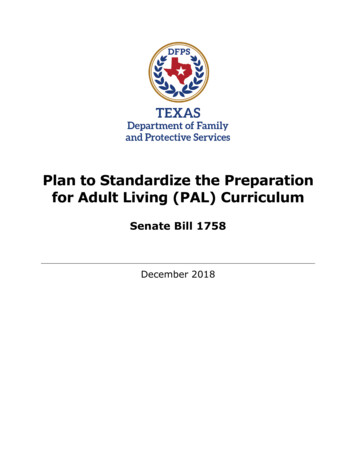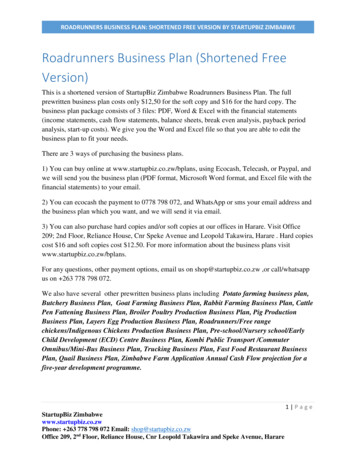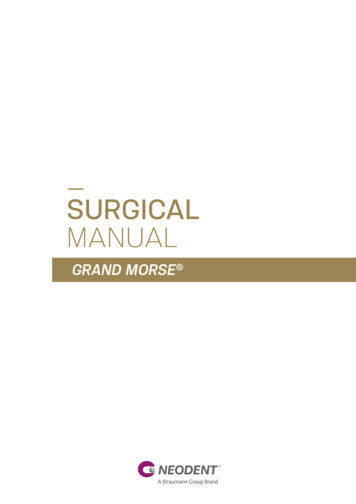
Transcription
Plan to Standardize the Preparationfor Adult Living (PAL) CurriculumSenate Bill 1758December 2018
Table of ContentsIntroduction . 1Description of Services . 1Transitional Living Services . 1Preparation for Adult Living Services. 1Coordination with Stakeholders . 3DFPS Actions to Standardize Curriculum for the Preparation for Adult Living Program . 4Appendix I: Workgroup Members . 6Appendix II: Recommendations Outside the Scope of Report . 7i
Plan to Standardize the Preparation for Adult Living (PAL) CurriculumIntroductionPursuant to Senate Bill 1758 (SB1758), 85th Legislative Regular Session, 2017, the TexasDepartment of Family and Protective Services (DFPS) is directed, in coordination withstakeholders, to develop a plan to standardize the curriculum for the Preparation for AdultLiving (PAL) program that ensures that youth 14 years of age or older enrolled in the programreceive relevant and age appropriate information and training.Description of ServicesTransitional Living ServicesTransitional Living Services (TLS) include a broad array of services and supports that helpyouth and young adults currently or formerly in foster care with their successful transition toadult living. Transitional Living Services are multipurpose and are available to youth ages 1423. Transitional Living Services include: the Preparation for Adult Living program (PAL),which includes Individual Case Management and Aftercare Services; Education and TrainingVoucher (ETV) program; Extended Foster Care program (including Supervised IndependentLiving Housing); medical benefits; Tuition Fee Waiver; and other related services and resources.Preparation for Adult Living Services (PAL)One component of Transitional Living Services is the PAL program. PAL services include a lifeskills assessment, life skills training, transitional living allowance, aftercare room and board,individual case management services, and other financial assistance, as funding is available.Eligible youth, beginning at age 14 up to age 21, receive services and benefits that help youthachieve self-sufficiency and become productive adults.The PAL Life Skills Training Curriculum Outline covers six core elements (five hours classroomtraining on each core element and two experiential activities per class):1.2.3.4.5.6.Health and Safety;Housing and Transportation;Job Readiness;Financial Management;Life Decisions and Responsibilities; andPersonal and Social Relationships.At the beginning of the class, the Casey Life Skills Assessment (CLSA) is completed by youthand their caregiver to assess the youth’s strengths and needs. At the conclusion of the classes, a1
Plan to Standardize the Preparation for Adult Living (PAL) CurriculumKnowledge Assessment that is comprised of true/false and multiple choice questions isprovided to the youth. The Knowledge Assessment is utilized to determine what informationyouth gained from the classes and evaluate the PAL contractor’s effort at providing thecomplete life skills curriculum to the youth.When classes are not available or attendance is not practical, youth may complete the trainingthrough one of other available methods including: Independent study guide (on line or paper form); orThrough the school as verified through their Individualized Education Program(IEP) or Admission, Review and Dismissal (ARD) documentation.In addition to classroom training, caregivers are required to provide experiential learningopportunities starting at age 14 to encourage and support the youth’s practical application oflife skills.DFPS PAL staff are responsible for reviewing and approving the regional PAL contractor’scurriculum prior to use or when replacing approved curriculum content to ensure materials areuniform, current, and relevant. Additionally, as part of the quality monitoring process, DFPSPAL staff observe at least one PAL class per trainer per year and document their observationsand share their findings with the DFPS regional contract manager.The DFPS PAL Life Skills and Assessment Services contract requires the contractor to provideexperiential activities, which include real life activities and opportunities that incorporate thefollowing:1. Physical and mental challenges to support the six core elements in the curriculumoutline;2. Actual physical activities such as providing youth with experience in completingapplications for jobs, housing, and scholarships; and3. Field trips to include (but not limited to) price comparison shopping at a grocery store,visiting a commercial kitchen and participating in preparation of a healthy meal, tours toWorkforce Center/apartments/colleges and ride on a bus.Additionally, youth are provided with a list of reinforcement homework activities per coreelement and are asked to complete a total of 2 homework activities per core element. This is atotal of 12 class hours outside of PAL Life Skills Training class hours -which promotescompetency in real life challenges that youth in transition may encounter. Examples ofhomework activities include, but are not limited to: Plan, shop for, and prepare a nutritious meal;Make a doctor or dentist appointment;2
Plan to Standardize the Preparation for Adult Living (PAL) Curriculum Select an apartment from an advertisement and prepare a monthly budget that includesmonthly expenses;Plan a bus trip and take it;Obtain an application for a real job and complete it;Research identity and credit theft;Tour the local workforce center or call to find out what services are available; andHave a discussion with someone of a different culture or ethnicity and find out what isunique to him or her.Coordination with StakeholdersIn January of 2018, DFPS formed a stakeholder workgroup comprised of 20 members1 thatspecialize in providing services to and/or work with youth and young adults in the foster caresystem and alumni. The stakeholder workgroup gathered information to inform therecommendations in this report in a variety of ways, including: Soliciting the input of youth in foster care and alumni through individual and groupdiscussions;Conducting informal youth and alumni surveys;Researching independent living programs in others states; andReviewing survey results provided by the Texas Network of Youth Services (TNOYS).This survey included feedback from some DFPS regional PAL staff, PAL and ExtendedFoster Care contractors, and others (such as Court Appointed Special Advocates forChildren)serving youth and young adults in and formerly in foster careTwo areas of focus emerged from this work: 1) Enhancing PAL classroom curriculum; and 2)Increasing experiential learning and skill development outside the classroom. Participants inthe workgroup evaluated current PAL classroom curriculum, materials, activities, andopportunities for curriculum improvement to support learning and skill development. Asecond subset of participants examined experiential activities and the role of caregivers,residential contractors, and others to enhance skill development for youth and young adults.The workgroup had discussion and provided recommendations about other areas oftransitional living and readiness for youth and young adults that exceeds the scope of thisreport. Additional information can be found in Appendix II of this report. DFPS intends to1Please see Appendix I for a list of workgroup member agencies.3
Plan to Standardize the Preparation for Adult Living (PAL) Curriculumexplore these recommendations with stakeholders as the work to improve transitional livingservices continues.Plan to Standardize Curriculum for thePreparation for Adult Living ProgramBased on the information reviewed, and the feedback solicited, consensus was reached thatsuggests that the current PAL Life Skills Training curriculum outline defined by the John H.Chafee Foster Care Independence Program (federal grant) is comprehensive and covers most ofthe topics regarded as important to equip youth with information necessary for their successfultransition to adult living. Standardization of the processes, methods for delivery, and evaluationof the efficacy of services were identified to better support youth enrolled in the PAL programand to ensure they receive relevant and age-appropriate information and training.These five areas of focus and subsequent plans include the following:1. Casey Life Skills Assessment (CLSA) Caregiver Assessment Plan: DFPS will examine and determine what (if any) changes need to be madeto PAL contracts and/or Residential-Child Care Contracts to ensure thatthe person who knows the youth best completes the caregiver portion ofthe CLSA. DFPS will also assess the caseworker’s role in assisting the caregiver incompleting the CLSA. Ideally, both the caregiver and caseworker shouldwork together in the completion of the assessment.2. Knowledge Assessment Plan: DFPS will review the current Knowledge Assessment to determine if thetool is adequately measuring what is needed to reflect that youth areobtaining quality services and are able to apply skills learned via the PALLife Skills training. DFPS may modify the tool as needed, based on thisreview.3. High school or college credit Plan: DFPS will collaborate with other state agencies to explore what changes,if any, would be necessary to the PAL Curriculum in order for thetraining to qualify as high school or college credit(s).4
Plan to Standardize the Preparation for Adult Living (PAL) Curriculum4. Experiential learning activities Plan: DFPS will examine the current experiential learning activities used inresidential treatment centers, shelters and kinship caregivers to determinelevel of uniformity across these placement types. Based on this review, DFPS may evaluate the use of “Ready, Set, Fly! AParent’s Guide to Teaching Life Skills” as a tool through a voluntary pilot withselect Residential Child Care Contractors. This resource guide wasdeveloped by Casey Family Programs, a national foundation focused onfoster care and child welfare.5. Services to younger youth Plan: DFPS will explore the costs associated with contracting for a curriculumdevelopment expert to make additions to the PAL Life Skills Trainingcurriculum specific to the 14 and 15 year old youth population. DFPS willalso research other available life skills assessment tools utilized by otherchild welfare agencies.5
Plan to Standardize the Preparation for Adult Living (PAL) CurriculumAppendix I: Workgroup Members ACH Child and Family ServicesAngel ReachCitySquare Transition Resource Action Center (TRAC)LifeworksNational Association of Social Workers/Texas ChapterTexans Care for ChildrenTexas Court Appointed Special AdvocatesTexas Department of Family and Protective ServicesTexas Network of Youth ServicesTexas State School of Social WorkUniversity of Texas at AustinUniversity of Houston-Clearlake6
Plan to Standardize the Preparation for Adult Living (PAL) CurriculumAppendix II: Additional Information andRecommendationsThe department remains committed to the continued engagement of stakeholders as we work toensure quality transitional living services are provided to youth and young adults as they exitcare. The stakeholder workgroup provided the following information and recommendationsfor additional exploration by the department.1. Amend the PAL Life Skills Training and Assessment Services contracts to remove theadministration of the Knowledge Assessment as a requirement as some questions areout of date and also may not reflect the true knowledge of the youth.2. Move the current Casey Life Skills Assessment (CLSA) interpretation meeting (requiredwith the youth, caregiver and caseworker are invited) from the PAL contractorresponsibility to the youth’s next service plan review and require the caregiver and allother pertinent stakeholders to attend for the purpose of reviewing and incorporationinto the youth’s service plan to address how the youth’s identified life skill needs andstrengths will be met.3. DFPS, along with other stakeholders, should review and appropriately revise currentstaff/contractor responsibilities so youth can receive more individualized casemanagement. This case management should utilize:o Life coaching to coordinate the services, supports and benefits that will preparethe youth for adulthood and ensure the specific tasks; ando Goals associated with their transition out of foster care or through extended careare met.4. Amend the Residential Child-Care contracts and Residential Child Care Licensingmonitoring guidelines to support and track fulfillment of existing CPS requirementsaround providing youth with normalcy and experiential life skills.5. Utilization of Ready, Set Fly:o Amend CPS policy and Residential Child-Care contracts to add the guide to therequired list of “other items” to be provided to a placement no later than 72hours after placement.6. Add the life skills assessment results and the Ready, Set, Fly Guide to the youth’seducation portfolio to inform current caregiver of skill development activities andachievements.o Ensure Residential Treatment Centers and Emergency Shelters have the guideand distribute to their staff.7
Plan to Standardize the Preparation for Adult Living (PAL) Curriculumo7.8.9.10.Incorporate components of the guide into monitoring tools to assist ResidentialChild-Care Licensing staff in communicating what has been accomplished andwhat is needed.DFPS, along with outside stakeholders, should explore how current DFPS YouthSpecialists job duties could potentially be developed into a peer-to peer model ofsupport for youth aging out of care.Amend licensing regulations related to restrictions around youth (16 and older) inResidential Treatment Centers being a part of the decision making about their ownmedical care and medication as well as other tasks that help them learn life skills.Review licensing requirements for foster homes and residential facilities pertaining toyouth in extended care in order to ensure there are no barriers to youth remaining intheir placement when turning 18 and choosing to participate in extended foster care,which is a voluntary program that allows a young adult to reside in a paid foster careplacement after DFPS conservatorship ends if the young adult is participating inqualifying activities and there is an available placement.Develop a plan for a graduated housing model that would allow youth a measuredmove toward independence.8
Dec 01, 2018 · This resource guide was developed by Casey Family Programs, a national foundation focused on foster care and child welfare. 5. Services to younger youth Plan: DFPS will explore the costs associated with contracting for a curriculum development expert to make a










